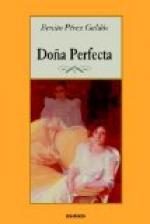The same ignorant or stubborn religiosity, negative for good, working evil for all affected by it, has been studied by Galdos in two subsequent novels, La Familia de Leon Roch and Gloria, which are generally reputed to be, with Dona Perfecta, the greatest of his works. Gloria, in particular, has received great and deserved laudation, in spite of some looseness and unevenness of the technique due to the rapidity with which it was written (the first part in hardly more than a fortnight, the author tells us). The theme is not unlike that of George Eliot’s Daniel Deronda, one of the protagonists being an English Jew, with the profoundest attachment to the traditions of his race, the other a Spanish girl, in whom the faith of her fathers is an ineradicable instinct. Few finer and more tragic situations have been imagined by moderns than this. No less tragic, though less poetic, is the ruin of Leon Roch, weighed down by the burden of an insanely bigoted wife.
Other groups of novels deal with the other aspects of the modern society of Spain of which mention has been made. In one group we have the disasters caused in lowly homes by the vanity of women who have caught a glimpse of the pleasures of the rich, and pitilessly demand them. The poor official, out of a place, in Miau, is goaded to suicide by the exactions of his wife and daughter and sister-in-law. In La de Bringas we have the squalid intrigues of a family on the edge of ‘high life’ and striving to get within it. El Amigo Manso loves, and is exploited for her social advantage by the woman whom he loves. A second group of tales deals with the hard question how the woman, left to her own resources and without income, shall find her support. Here belong Fortunata y Jacinta, La Desheredada, Tristana, and Tormento. It is the pathos of this problem, not its unseemly and revolting details, that impresses Galdos and that he strives to convey. And finally, there should be mentioned those stories in which Galdos shows us the beauty and uplifting power of natural sentiment, as Marianela; or the positive and beneficent results that may come from a certain pure and unbigoted, though somewhat mystical, religious feeling, as Angel Guerra, Nazarin, and Halma.
It is clear from the above hasty survey of Galdos’ work that there runs through it all a profound moral sentiment, a sense of the tragedy of modern life, an impatience of the irremediable and hopeless contradictions in which ignorance and intolerance involve us. At the same time, it should not be supposed that the general impression produced by his novels is gloomy and forbidding. On the contrary, few modern writers show so constantly the play of a free and wholesome humor, or in more manly fashion take life as it comes, without tears or whining. He does not strive nor cry; nor does he moralize. He shows us life as it appears to him in a critical period of his nation’s




